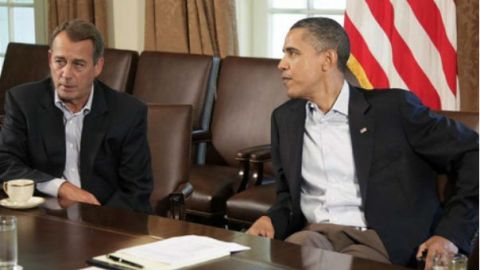Bring in the Mediator! Conflict Resolution Tips for the President, Congress, and the Rest of Us

As more Americans feel the effects of the ongoing sequester, government dysfunction continues in Washington. It’s time to bring in an expert in conflict resolution to help President Obama and Republican leaders in Congress work together for the sake of all Americans. (How much longer can this political gridlock last? We have a crisis called global warming that isn’t going away on its own.) Besides, in this challenging world, we should all learn how to keep the peace.
The big idea presented here is that we, the people, and our political leaders, need to learn how to work toward peace. In especially tense and tangled situations this can be difficult and often requires training and experts.
So I sought the advice of my trusted lawyer Deborah Hrbek, a mediator and entertainment lawyer in New York City. Her clients are as diverse as tech start-ups, media and publishing companies, and filmmakers and other artists. She provided legal support to Occupy Wall Street protesters and continues to work with OWS activists such as The Rolling Jubilee Fund, an initiative of OWS Strike Debt.
After interviewing Deborah, I learned that the process of mediation is a great way to turn conflicts into constructive relationships. Perhaps there’s hope for the President and Republicans (and our country) after all.
What is mediation and how does it work?
A mediator helps parties resolve disputes outside of the courtroom and without resorting to litigation. The rights and positions of parties are set aside, and instead they are encouraged to focus on articulating their separate concerns and identifying common goals. The mediator facilitates a dialogue between the parties and helps them explore their respective underlying concerns that are fueling the emotions that surround the facts of the dispute and inhibit compromise.
Is there a philosophy or school-of-thought behind the practice? Is the study of psychology or therapy involved in order to become a mediator?
While a person does not have to be a lawyer or a therapist in order to act as a mediator, mediators do tend to come from the fields of law or psychology. In fact, non-lawyers are more amenable to a process that is interest-based rather than rights-based. In mediation training, lawyers first need to unlearn much of what they learned in law school about conflict resolution. They need to stop seeing the conflict from an adversarial perspective. The key is to listen. A good mediator is able to demonstrate to each party that he or she is not only listening to, but also understanding, what they have to say. Then the mediator can help articulate to the other party what is being said, using the language and tone that the other party is capable of hearing.
Washington is nothing but gridlock these days. If you were brought in to mediate between President Obama and the Republican leadership in Congress, where would you start? How would you go about trying to help them work together?
In order for mediation to work, there needs to be a good faith desire on both sides to resolve the dispute. Where the principal goal of one party to a dispute is to keep the conflict alive, then they are unlikely to participate in an effort to make peace. For mediation to be successful, both parties need to engage in a good faith effort to reach an amicable resolution to the issue at hand.
Therefore, the mediator would have to find a way to help the Republicans see the ways in which it is not in fact in their own interests to be engaging in obstructionist behavior. This would be a threshold requirement of a constructive mediation, and probably an insurmountable hurdle given the personnel involved. However, one approach would be to ask the intransigents a series of questions along the following lines: In what way does holding up the nomination of a head of the EPA serve the interests of your constituents? What do you hope to accomplish by repeatedly bringing the issue of healthcare legislation up for a vote? Insofar as you lost the 2012 election, can you see a way to permit the current administration to govern, and implement the policies that the voters evidently put them in power to implement, while still holding true to your own values? But a good mediator would avoid displaying bias by addressing questions to the Democrats also, questions that are formulated to encourage them to examine their own actions to the extent that those actions may be contributing to the impasse.
In truth, I would be a poor choice for a mediator in this case. Even with my training and experience in the field, I would find it impossible to mask my own disgust with the conduct of the House Republicans.
What if one party is being particularly stubborn? Is there anything a mediator is trained to do or say to persuade that person to work toward a solution?
Mediators are trained to unpack the layers that are obscuring the fundamental concerns of the parties that are keeping the dispute alive. Very often, the real reason for the conflict is not the articulated reason for the conflict. A mediator will work with each party — either together in the same room or separately, when that is considered more effective under the circumstances — to get them past the blinders of their positions and to help them hear the concerns of the other party. Often when empathy can be found, when each party begins to imagine themselves in the shoes of the other, a solution is not far behind.
Another approach is to look for solutions that address the concern of one party without hurting the other. For example, a sincere apology can go a long way. In many disputes, this simple act can turn the entire thing around.
That said, none of these techniques work if an amicable resolution is not understood to be in the interests of both sides. Where one side thinks they can do better by sustaining the conflict, the only way to successfully mediate would be to find a way to help them see that they can better achieve their ultimate goals by compromising and finding a way to work together with their opponents.
Which books or leading thinkers have given you inspiration in your work as a mediator?
Mahatma Gandhi. The Dalai Lama. “Getting To Yes” by Robert Fisher.
Do you have anything interesting you could share about what you’ve observed and learned about human behavior while doing this type of work?
The most interesting thing that I have learned in the course of my mediation work is that disputes are almost never what the parties think they are about. It is never really about the money, for example. It is about what the money represents and the underlying emotions that accompany it. If I take $50 from you without objective justification, and a judge makes me return it to you, this may superficially resolve the dispute. However, it is fairly likely that you and I will continue to dislike one another. A good mediator would help me to see that it was unfair of me to take the $50 from you so that I really want to give it back. The mediator would help you to see that I only took the $50 because I was genuinely operating under the mistaken understanding that you owed it to me. There would then be some likelihood that you would forgive, and I would be okay with having returned the funds, and we may be able to have a constructive relationship going forward.
What advice do you have for someone who is confronted by an abrasive person? How can they best calm that person down in the heat of the moment?
People tend to be abrasive when they feel threatened. A good mediator will patiently talk with the person, and more importantly hear what they have to say. When the mediator “reframes,” by repeating back to the person what they have told the mediator and thereby affirming that the person is being heard, this can instantly serve to diffuse a situation and disarm abrasiveness.
Is mediation more affordable than other routes? How so? Is the hourly rate typically the same as traditional legal services?
In many cases mediation is a more affordable, and generally pleasant, mode of dispute resolution. Hourly rates are similar to those of lawyers, though the costs are shared by the parties. If the parties are not genuinely trying to resolve the dispute, however, mediation may serve to increase the costs. This is because, following a failed mediation, the parties may have the same costs that that they would have had had they simply litigated in the first place.
The real benefits of a successful mediation, however, are not direct, nor are they purely financial. Business partners who are able to work through a dispute with the help of a mediator can go on to run a profitable business together. Parents who are fighting over child-rearing styles can learn to communicate better through mediation and go on to provide a more stable and healthy environment in their home. Creative professionals who find themselves at logger-heads during the production of a television show can save the project if they can learn to work together constructively as a result of engaging in the process of mediation.





